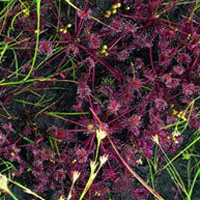Gluten Free
What does following a gluten-free diet mean? That you're embarking on an easy diet with a wide range of health-promoting effects. Instead of dwelling on what you’re giving up, consider that you’re going to enjoy a whole new world of delicious food options to meet your special dietary needs. You’ll be eating seasonally, choosing more fresh fruits and vegetables, focusing on meats, seafood, poultry, legumes, lentils, corn, and rice, and discovering fascinating ancient grains such as quinoa, amaranth, and millet. You’ll be able to eat potatoes, eggs, most cheeses, even chocolate (!)—and enjoy them without guilt because you’ll be taking good care of your body. In fact, you’ll probably end up eating—and feeling—better than ever!
Visit this page for more information about living Gluten Free
---
We carry a large variety of gluten free items, the brands listed below represent just some of the offerings we carry















More Diets
Sundew
 © Martin Wall
© Martin WallHow It Works
Naphthaquinones are believed to give sundew the antispasmodic (or relief from coughing spasms) effect that has made it such a popular cough remedy in Europe.3 These naphthaquinones include plumbagin, ramentone, ramentaceon, and biramentaceone. Pharmacological studies show a clear antispasmodic effect in the respiratory tract.4 One naphthaquinone was found in an animal study to be comparable to codeine in its ability to suppress the impulse to cough. This finding has not been repeated in human studies, however. Based on this effect, sundew is often referred to as an herbal antitussive (a substance capable of preventing or relieving coughing). Human trials have shown its value either alone or in combination with other herbs for the treatment of coughs associated with bronchitis, pharyngitis, laryngitis, and even whooping cough.5
How to Use It
Adults and children older than 12 years of age may take 1/2–3/4 teaspoons (3 grams) per day.6 To prepare tea, boiling water is poured over 1/4–1/2 teaspoon (1 to 2 grams) of finely cut sundew root and above-ground parts, then strained after steeping for ten minutes. One cup (250 ml) may be taken three to four times daily. In Europe, liquid preparations of sundew are often combined with thyme, another antitussive, in cough syrups for adults and children. A tincture of sundew, 1/8–1/4 teaspoon (0.5 to 1.0 ml) three times per day, is also sometimes used.
Copyright © 2025 TraceGains, Inc. All rights reserved.
Learn more about TraceGains, the company.
The information presented by TraceGains is for informational purposes only. It is based on scientific studies (human, animal, or in vitro), clinical experience, or traditional usage as cited in each article. The results reported may not necessarily occur in all individuals. Self-treatment is not recommended for life-threatening conditions that require medical treatment under a doctor's care. For many of the conditions discussed, treatment with prescription or over the counter medication is also available. Consult your doctor, practitioner, and/or pharmacist for any health problem and before using any supplements or before making any changes in prescribed medications. Information expires December 2025.











